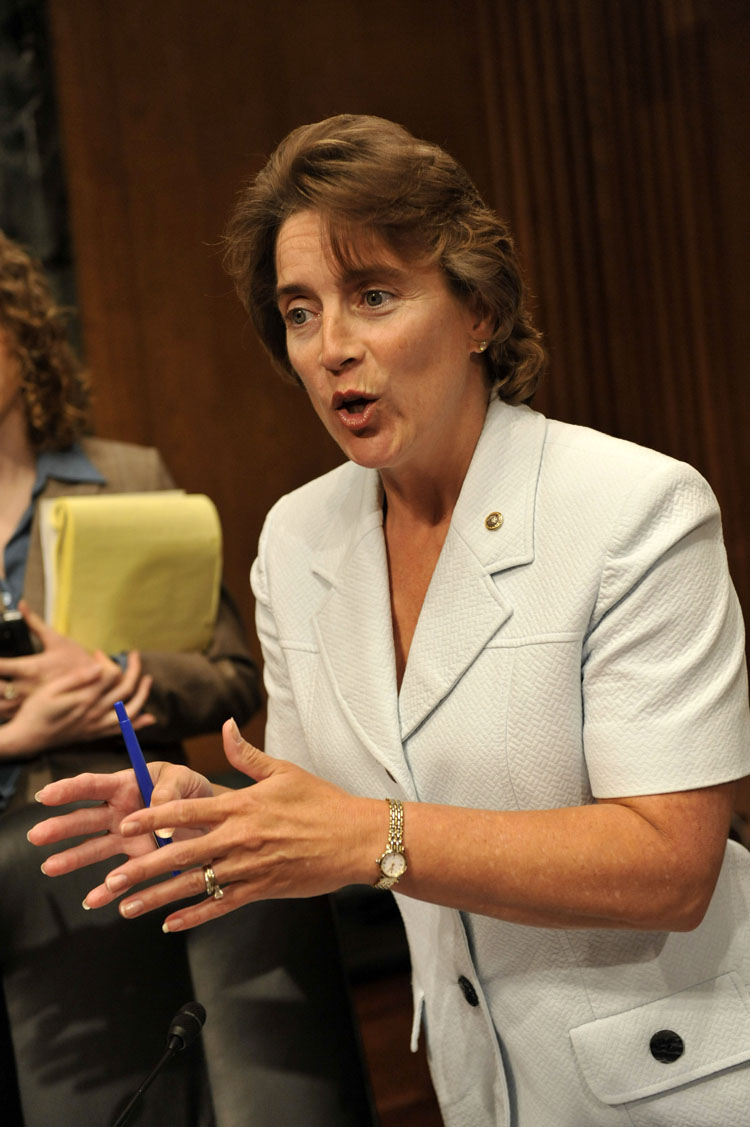Sen. Blanche Lincoln (D-AR) was never going to have an easy time winning re-election in 2010. As a conservative Democrat facing reelection in a state that went for John McCain by an overwhelming 59-39 margin, she has had to do a delicate dance to distance herself from the national party led by a Democratic President whose unfavorable ratings there hover around 60 percent. And it doesn’t help her cause that the conservative base has been re-energized by their antipathy to her party.
But instead of dancing with a ballerina’s deft footwork, Lincoln has often struggled with two left feet. As time has gone on–and as her prospects for reelection have diminished–Lincoln has stumbled repeatedly.
Late last year, as the health care fight was taking shape in the Senate, Lincoln joined Sens. Ben Nelson (D-NE), Mary Landrieu (D-LA), and Joe Lieberman (I-CT) in a joint effort to kill the public option. Most Democrats, and all progressives, were enthusiastic supporters of the public option, but the GOP decried it as the seed of a “government takeover” of health care. (The final health care law contains no public option, but GOP leaders nevertheless continue to characterize the legislation this way.)
If a public option stayed in the final health care bill, Lincoln threatened, Senate Majority Leader Harry Reid should expect her and her allies to join Republicans in a health care filibuster. There was just one problem: Lincoln had been on the record for months in support of a public option, and on the eve of her threat, her website reflected that support.
It goes on.
Though Lincoln has been vulnerable for months, she didn’t look ahead to the possibility that she’d have to defend herself from the left. In late January, after Scott Brown’s victory in Massachusetts, Lincoln reacted to an unflattering environmental scorecard by dubbing the League of Conservation Voters a “extremist” group. She also beseeched Obama to eschew the “extremes” on both sides to forge compromise with the GOP. Within days, Arkansas Lt. Governor Bill Halter announced he’d be running as a liberal alternative to Lincoln in the Democratic primary.
Also in January, with the fate of health care on the line, Lincoln leapt to the front of the pack to announce her opposition to using the reconciliation process to fix the Senate bill, which serves as the basis of reform. This put her in the strange position of having voted for a major health care overhaul–complete with controversial provisions like the ‘Cornhusker Kickback’–only to turn around oppose the one viable effort to make the bill more popular.
Early on it looked like several conservative Democrats might join Lincoln in opposing the reconciliation route, but when it came time to vote, almost all Democrats voted to pass the package of fixes. The exceptions were Nelson, Sen. Mark Pryor (D-AR), and Lincoln herself. After the vote, Pryor issued a statement arguing that the reconciliation bill wasn’t in Arkansas’ best interest. But Senate aides say his vote was designed to give Lincoln cover. She had dug herself in too deeply change course.
The streak continues: Lincoln has taken to attacking “Washington, D.C. unions” for supporting Halter in the primary–but only after publicly soliciting their support herself.
All of these examples point to the fact that for the past year, Lincoln has been thinking only one step ahead–and when confronted with unforeseen circumstances, abruptly switches course, without regard for the lengthy paper trail behind her. It’s been a bumpy journey.
All in all, though, it’s unclear how Lincoln’s swerving has affected her re-election prospects. Recent polling data indicates that her lead over Halter is shrinking and her disapproval ratings remain sky high. But they also show her gaining ground on her likely general election opponent, state Rep. John Boozman. A recent Research 2000 poll finds Boozman’s lead over Lincoln down to seven points, where weeks ago he was up by perhaps 20.
Either way, it would be hard to accuse Lincoln of handling her political vulnerabilities with unusual elegance. And if she manages to weather her primary challenge, it will be despite–not because–of these clumsy steps.










